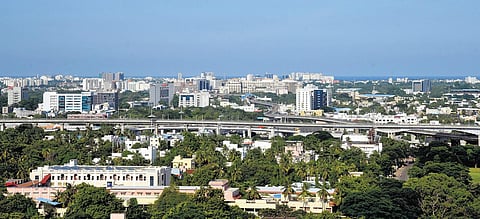New commercial building code to cut power consumption of AC units in Tamil Nadu
CHENNAI: Large commercial buildings in Tamil Nadu will soon have to be designed to save energy. Considered to be a major cause of greenhouse gas emissions, commercial buildings are dependent on air conditioners and fans as 60% of the power used in cities like Chennai is consumed by such equipment in commercial and residential buildings.
The state is, therefore, planning to regulate commercial buildings by introducing the Tamil Nadu Energy Conservation Building Code 2022 (ECBC) in building rules as a mandatory requirement. The Tamil Nadu combined development and building rules (TNCDBR) will have clauses to target commercial buildings that consume significant amounts of electricity and require adherence to energy conservation building codes created by the Bureau of Energy Efficiency.
The code will be applied to commercial buildings with a connected load of 100 kilowatts (kW) or above or a contract demand of 120 kilo-Volt Ampere (kVA) or above or a built-up area of 2,000 square metres or above. Under the new clauses, commercial buildings have to be designed for saving energy or reducing cooling or heating loads. The draft clause also has an energy performance index for buildings that calculate annual energy consumption of a building in kilowatt-hours per square metre of the area of the building.
The focus will be on building walls, windows with sunshades and roofs that limit the amount of sunlight and heat entering the buildings so that dependence on air conditioners is reduced. But, the plan to include clauses in the code could mean the construction cost of commercial buildings might go up.
Srinivas Akinipatti, senior director, Tamil Nadu & Kerala, Knight Frank India, told TNIE, “Capital expenditure will be high initially, but operating expenditure will be highly beneficial in the next seven to 10 years.” He also said the world is migrating towards sustainable buildings and implementing the TNECBC would be a step in the right direction.
Former Anna University professor K P Subramanian said enforcement of TNCDBR itself is marked by a lot of violations and deviations. Adding conservation code to it will be an added burden for effective enforcement, though the former is a good concept and saves money for commercial enterprises. “An ideal strategy might be to enforce ECBC through incentives and disincentives as in the case of green buildings. Differential tariff for ECBC compliance and non-compliance buildings may be one such strategy,” he said.

